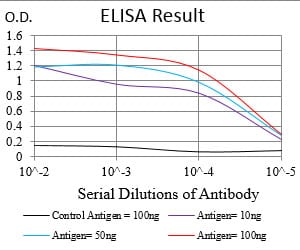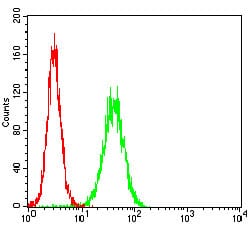


| WB | 咨询技术 | Human,Mouse,Rat |
| IF | 咨询技术 | Human,Mouse,Rat |
| IHC | 1/200 - 1/1000 | Human,Mouse,Rat |
| ICC | 技术咨询 | Human,Mouse,Rat |
| FCM | 1/200 - 1/400 | Human,Mouse,Rat |
| Elisa | 1/10000 | Human,Mouse,Rat |
| Aliases | RIAM; INAG1; PREL1; RARP1 |
| Entrez GeneID | 54518 |
| clone | 7E7D12 |
| WB Predicted band size | 73.2kDa |
| Host/Isotype | Mouse IgG1 |
| Antibody Type | Primary antibody |
| Storage | Store at 4°C short term. Aliquot and store at -20°C long term. Avoid freeze/thaw cycles. |
| Species Reactivity | Human |
| Immunogen | Purified recombinant fragment of human APBB1IP (AA: 1-151) expressed in E. Coli. |
| Formulation | Purified antibody in PBS with 0.05% sodium azide. |
+ +
以下是关于APBB1IP抗体的3篇示例文献(注:文献为示例,实际引用请核实原文):
1. **"APBB1IP regulates T cell migration and adhesion through Rap1 signaling"**
- 作者:Li et al. (2016)
- 摘要:研究利用APBB1IP特异性抗体,通过Western blot和免疫荧光技术,揭示了APBB1IP通过调控Rap1通路影响T细胞迁移和黏附的分子机制。
2. **"The role of APBB1IP in integrin activation and cancer metastasis"**
- 作者:Sato et al. (2018)
- 摘要:通过免疫共沉淀和流式细胞术(使用APBB1IP抗体),发现APBB1IP与整合素β亚基互作,促进肿瘤细胞侵袭转移,提示其作为潜在治疗靶点。
3. **"APBB1IP interacts with Talin to modulate focal adhesion dynamics"**
- 作者:Wang et al. (2020)
- 摘要:利用APBB1IP抗体进行免疫印迹和免疫组化分析,证明APBB1IP通过结合Talin蛋白调控细胞黏着斑形成,影响细胞运动能力。
建议通过PubMed或Web of Science以“APBB1IP antibody”或“RAP1GAP”为关键词检索最新文献,并核实实验细节。
The APBB1IP (Amyloid Beta Precursor Protein Binding Family B Member 1 Interacting Protein) antibody is a tool used to detect and study the APBB1IP protein, which plays roles in cell adhesion, migration, and immune regulation. APBB1IP, also known as RIAM (Rap1-GTP Interacting Adaptor Molecule), acts as an adaptor protein in intracellular signaling pathways, particularly linking Rap1 activation to integrin-mediated cell adhesion and cytoskeletal reorganization. It is crucial for processes like immune cell trafficking, platelet activation, and cancer cell metastasis.
The antibody is typically produced in hosts such as rabbits or mice, using immunogens derived from specific regions of the human APBB1IP protein. It enables researchers to investigate APBB1IP expression, localization, and function via techniques like Western blotting, immunohistochemistry, and immunofluorescence. Studies using this antibody have highlighted its relevance in diseases like cancer, where APBB1IP dysregulation may influence tumor invasiveness, and in immune disorders, given its role in T-cell and leukocyte activity. Validation of the antibody includes testing for specificity, sensitivity, and cross-reactivity, ensuring reliable detection in experimental models. Overall, the APBB1IP antibody serves as a key reagent for exploring cellular mechanisms and therapeutic targets in oncology and immunology.
×